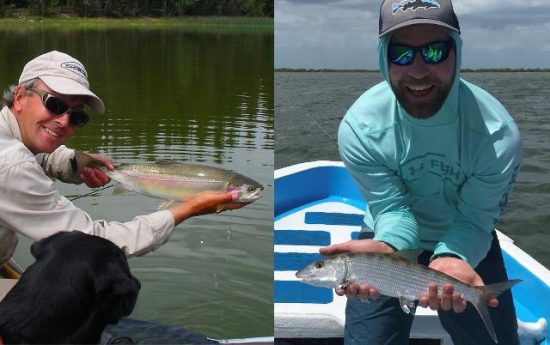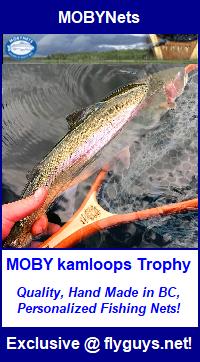Always Fly Casting was established in 2022 by me, Drew Alway, with the goal of helping those interested in learning fly casting in the Kamloops and Logan Lake areas. While most of the services we provide are two-student personalized lessons, we also run lessons for larger groups. Clients include local fly-fishing clubs, youth organizations, and fish and game associations. Both Ken Woodward and I are Fly Fishers International (FFI) Certified Casting Instructors.

Ken Woodward | Drew Alway | Always Fly Casting
Why should you take fly casting lessons?
An Introduction to Always Fly Casting
The BC Interior is blessed with amazing fly fishing in lakes that are mostly known for their spring hatches. For astute fly fishers, great fishing can be extended into the summer and fall, too. Casting caddis patterns on early summer evenings and stripping scuds in shallow water in the fall can be amazing experiences. Those anglers benefit from accurate casting, targeting trout sipping (or smashing!) dry flies at the surface (check out the previous BCFlyguys caddis videos), and probing the edge of weed lines with scuds.
Many fly fishers state that you don’t have to cast very far to take advantage of chironomid hatches since they can basically plop an indicator rig a few metres downwind off their boat and wait for their indicator to disappear. However, sometimes they may need to make long casts when searching for fish, or they might not be able to move their boat due to other boats anchored nearby so they’ll have to cast further to fish new water. Being a competent caster makes fishing with long leaders – with or and without indicators, much more pleasurable and efficient, too – fewer tangles!
When fishing a shoal where large, wary fish are located, skilled casters will typically enjoy more hookups since they can stay further away from the fish, thus reducing the chance of startling them with their presence, and they can present their fly accurately to an optimal location to intercept cruising fish. They also minimize disturbing the water with their fly line, spooking fewer fish.
It sure helps to be an efficient caster when learning a new lake, or when fishing in windy conditions, and that also significantly reduces time repositioning and re-anchoring your boat – all good reasons to learn proper casting skills.
Here are our top 8 reasons to learn fly casting with a FFI Certified Casting Instructor:
- Ability to enjoy fly fishing to its full extent.
- Ability to efficiently cast in the wind.
- Avoid sticking a sharp hook into your or your fishing partner’s ear! Or elsewhere!
- Accurately cast to active fish.
- Be prepared for that bucket-list guided trip.
- Get the most out of your gear investments, which can be significant.
- Avoid developing habits that will hinder your fly-casting advancements.
- Prevent injury from poor casting technique; wrists, forearms and shoulders are hard to heal.
As part of our plan to increase understanding on the importance and benefits of casting on BC Interior stillwaters, we will be working with BCFlyguys to bring you a series of articles & videos that will improve your overall fly fishing game. We will be discussing topics such as common casting faults/correction, casting techniques for long leader chironomid rigs, our favourite casts to utilize on stillwaters, casting techniques when searching for trout, and casting in the wind. Stay tuned as you will definitely be able to take away something that will up your fly-fishing game from each article! Improving your casting WILL improve your fishing! If you can get your fly presented to the fish with fewer false casts, cast accurately to your target location without adding unwanted knots to your leader, your fly will spend more time in the fishing zone, and that will increase your probability of hookups.
Finally, here’s a little casting advice. In the past many believed that we should teach beginner casters “every cast is done by stopping the rod at 10 o’clock and 2 o’clock” (on the old school clock face). This is not always true. Matching the rod load (bend) with optimal stopping angle will result in a straighter rod tip path, thus a straighter line path, and that will produce a more efficient loop, so for most 30 to 40 ft casts try stopping the rod firmly at 11 o’clock and 1 o’clock. Give it a try next time you’re on the water or practicing on the grass.
If you are interested in booking personalized or group casting lessons, please contact us at [email protected] or shoot us a line through the website Fly Casting Lessons – Always Fly Casting
If you have any other fly casting questions or topics you’d like us to cover, feel free to ask.
*** for more still water fly fishing strategies please hit up & review our still water fly fishing category here!
Like our stuff? Subscribe by ![]() Feed or
Feed or ![]() Email
Email .jpg)









